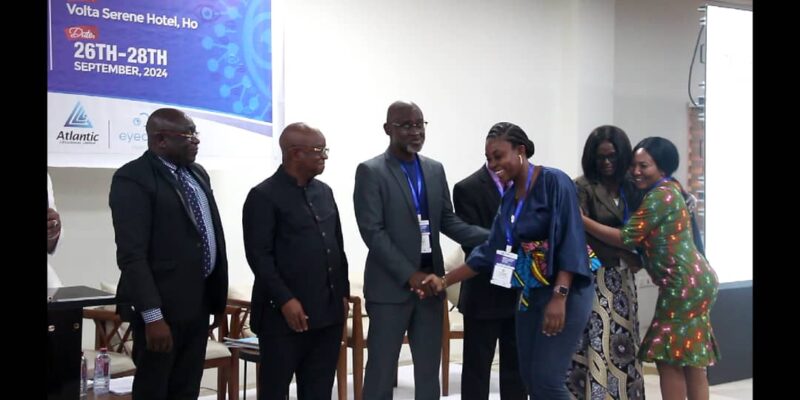The Chief Examiner of the Faculty of Ophthalmology at the Ghana College of Physicians and Surgeons, Professor Seth Lartey, has once again renewed the call for legislation on tissue and organ donation, specifically focusing on corneas.
Speaking at the 33rd Annual General and Scientific Meeting of the Ophthalmological Society of Ghana, held in Ho, Prof. Lartey stressed the transformative impact such laws could have on the lives of individuals suffering from corneal blindness, potentially restoring their sight and improving their quality of life.
Corneal blindness remains a significant health challenge in Ghana, particularly affecting individuals in their productive years.

Globally, corneal diseases rank among the leading causes of blindness, and Ghana is no exception.
According to the 2015 Ghana Blindness Survey, corneal blindness accounts for 11% of all blindness cases in the country.
This year’s conference, themed "The Fight Against Corneal Blindness in Ghana: The Journey So Far and The Way Forward," brought renewed urgency to the issue, highlighting the need for stronger policy interventions.
During his address, Prof. Lartey underscored the importance of passing laws that would enable the harvesting and transplanting of organs and tissues, including corneas. “Passing this legislation will allow us to harvest and transplant tissue, restoring quality of life for those affected,” he stated, emphasizing the life-changing impact this could have on individuals living with preventable blindness.

The President of the Ophthalmological Society of Ghana, Dr Dzifa Bella Ofori-Adjei, echoed these sentiments, calling for a robust policy framework to support ongoing efforts in tackling corneal blindness. “A strong policy framework is essential for the continued advocacy and support of these critical health interventions,” she noted, urging stakeholders to prioritize the issue.
Dr Archibald Yao Letsa, the Volta Regional Minister, also highlighted the government's role in expanding the necessary infrastructure and specialized training to support corneal transplants and other essential treatments. “Investing in health infrastructure and specialized training is crucial to tackling blindness and improving healthcare delivery,” Dr Letsa remarked.
As calls for legislative action grow louder, stakeholders are pushing for a future where more Ghanaians can regain their sight through advancements in medical technology and stronger healthcare systems.
The passage of a tissue and organ donation law could be a game-changer, offering hope to thousands across the country who are suffering in darkness.
Latest Stories
-
Lack of trust in Africa’s financial systems hurting economic growth – Prof. Bokpin
2 minutes -
JoySports partners Absa Black Star Marathon
9 minutes -
Government to host high-level Agribusiness Forum as Trade Ministry rolls out interventions to boost industrial growth
11 minutes -
Red Bull sack team principal Christian Horner
11 minutes -
Government commits to environmental protection
13 minutes -
Gov’t intensifies crackdown on substandard cement producers, deploys 300 inspectors
15 minutes -
‘Maybe I wasn’t good enough’ – Fuseini on not joining Nordsjaelland after Right to Dream
16 minutes -
Hearts of Oak hit with another transfer ban despite settling New Edubiase debt
19 minutes -
Kasoa-Winneba Robbery: Suspect gets 25-year jail term
23 minutes -
Mahama can’t be trusted to defend Ghana’s values against LGBTQ+ – Ntim Fordjour
31 minutes -
IMF’s caution against artificial stability of Cedi vindicates our red flag – IERPP
39 minutes -
I want to lead Ghana to the 2026 World Cup – Mohammed Fuseini
45 minutes -
UniMAC-IJ student wins cash prize at 2025 Commonwealth Day essay competition
50 minutes -
Ghana’s CEOs’ optimism and appetite for GenAI risen rapidly – PwC CEO Survey
54 minutes -
Exclusive with Mohammed Fuseini: Black Stars forward talks, national team and club career
1 hour

